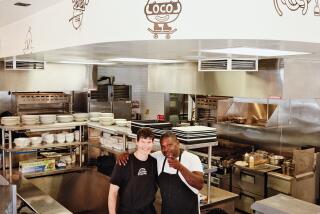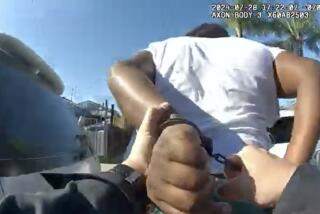The Way It Was When Stopped by LAPD 26 Years Ago
- Share via
FAIRFAX, VA. — When Watts went up in smoke in the summer of 1965, President Lyndon B. Johnson sent out a small team of federal officials to work on the problem. I was the only black in the group.
One night, after a week of the most intense effort, our boss, the late Leroy Collins of Florida, told John Perry and me that since the work was winding down, Perry and I should go out and get a good meal for a change.
On the way back from a restaurant with Perry, a white Southerner behind the wheel, I noticed a police car shadowing us. The officers switched on their lights and siren just as we turned off Wilshire Boulevard to go to our hotel. We were ordered out of the car by two policemen who held long guns.
Though we had broken no laws, and wore suits and ties, we were separated and roughly frisked.
I annoyed my officer by behaving like an innocent and indignant citizen, and he responded by swinging the muzzle of his gun in the direction of my face.
Perry’s white face and Southern accent had broken through to the other officer, who realized what a huge hole they’d dug for themselves.
They soon left, apologizing that they had just been responding to a call about robbers, whose description fit us to a tee.
We complained immediately, and the officers were suspended for 30 days without pay.
For the next three and a half years, I was director of the United States’ Community Relations Service, and urban disturbances were my beat. Though those disturbances had many causes, the flash point was almost always police-community friction.
We learned in those days, in the community relations and police business, that it was necessary for citizen relations and restrained behavior to be prominent in all police training and retraining courses. We also learned that it had to be a command imperative pounded on from the very top of the department over and over and over again.
I know that policing is a tough and vastly under-appreciated profession, and I know that some police officers meet more unsavory characters in a week than most of us encounter in a lifetime.
And that is exactly the reason community relations has to be nailed into the ethos of every police department in the country by its commander and by its trainers. Unfortunately, that wasn’t the case in Los Angeles in 1965, and it doesn’t appear to be the case today.
More to Read
Sign up for Essential California
The most important California stories and recommendations in your inbox every morning.
You may occasionally receive promotional content from the Los Angeles Times.













